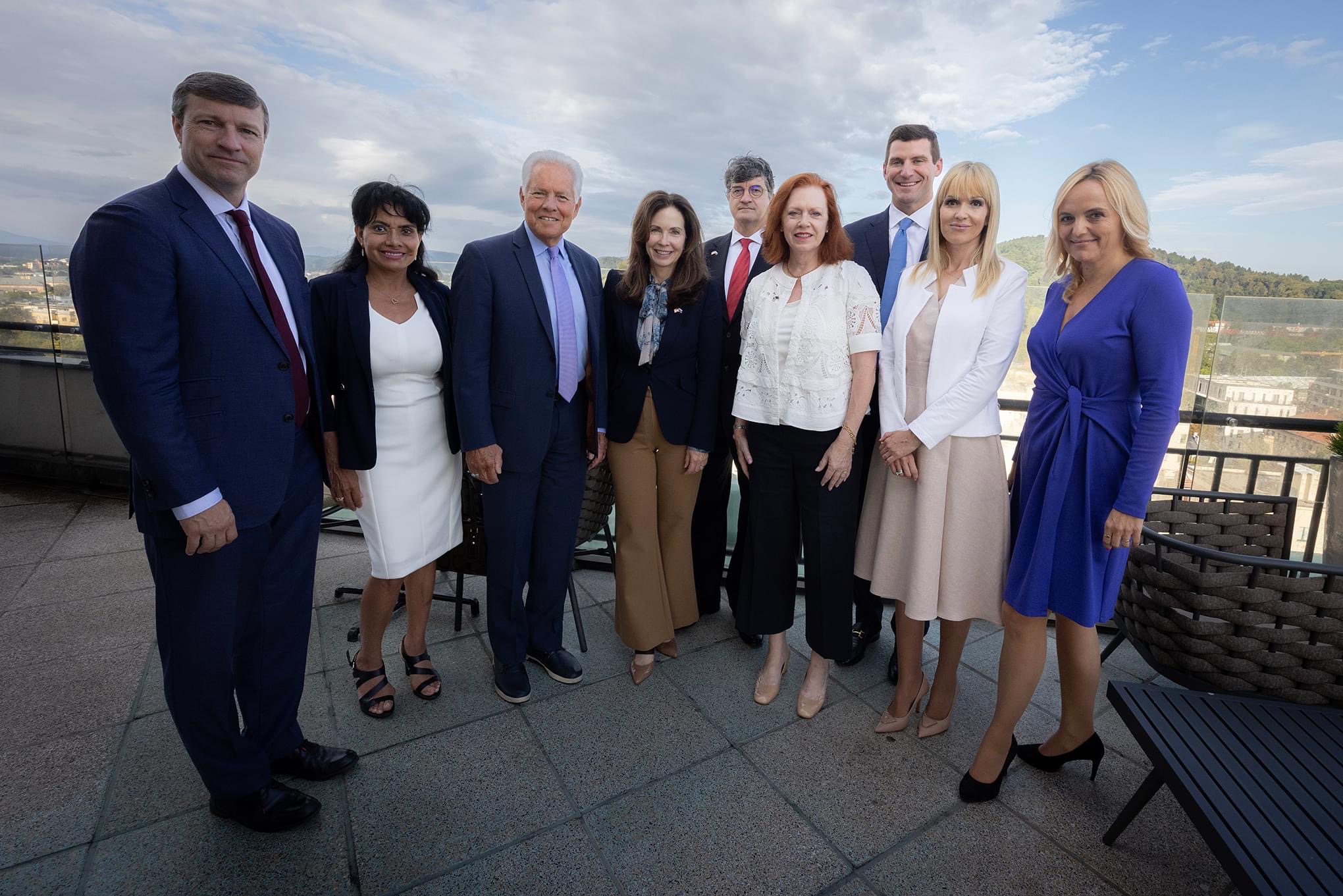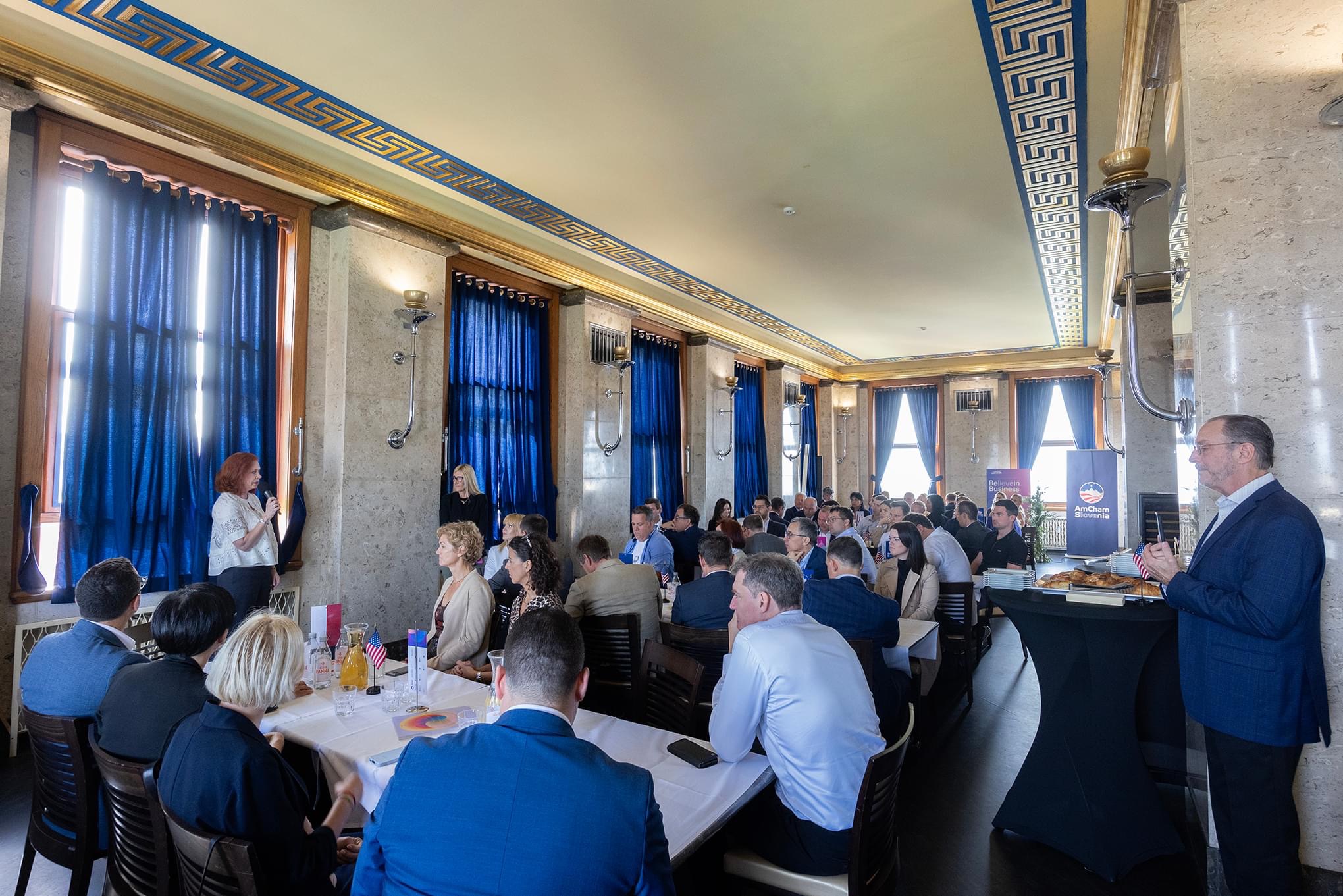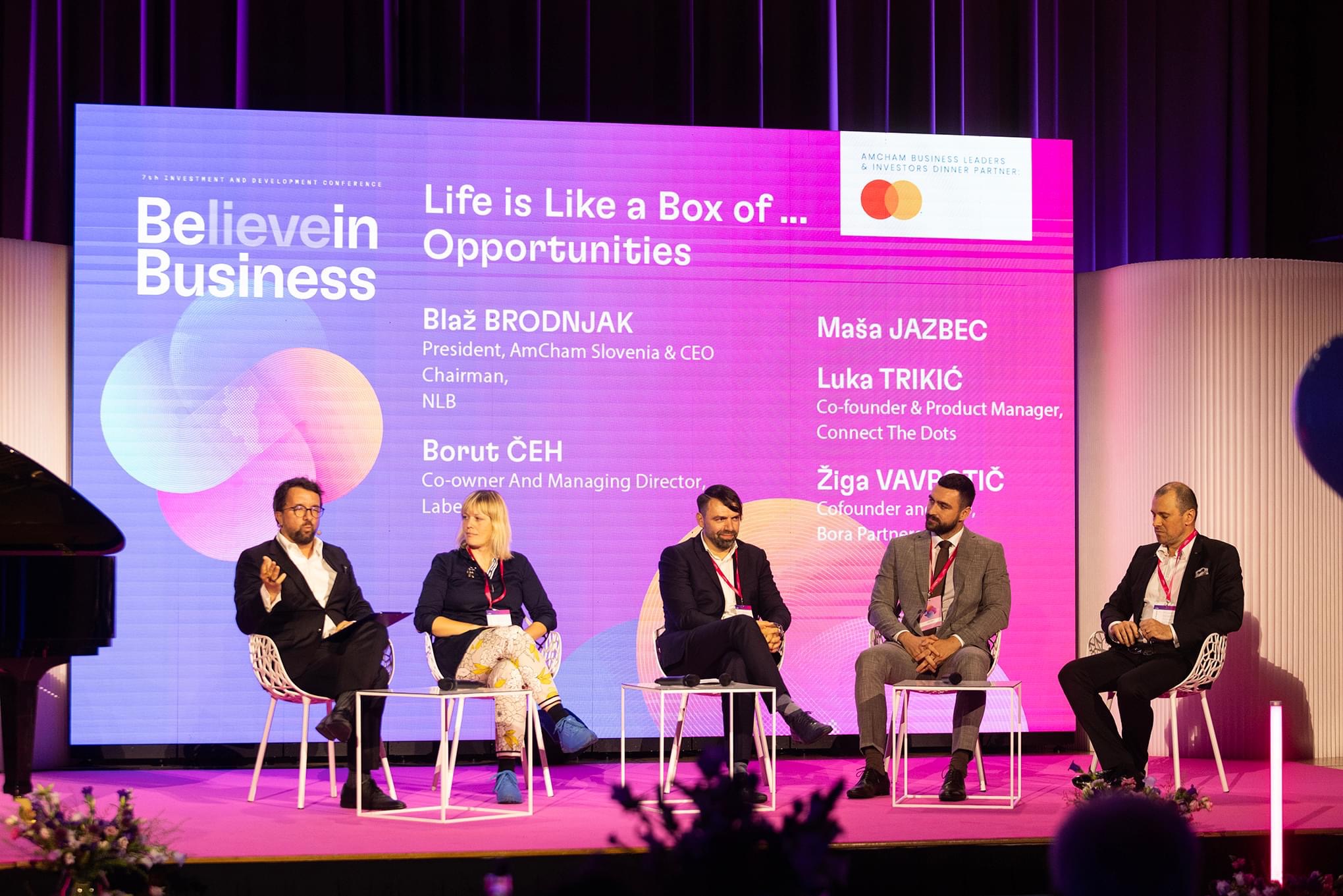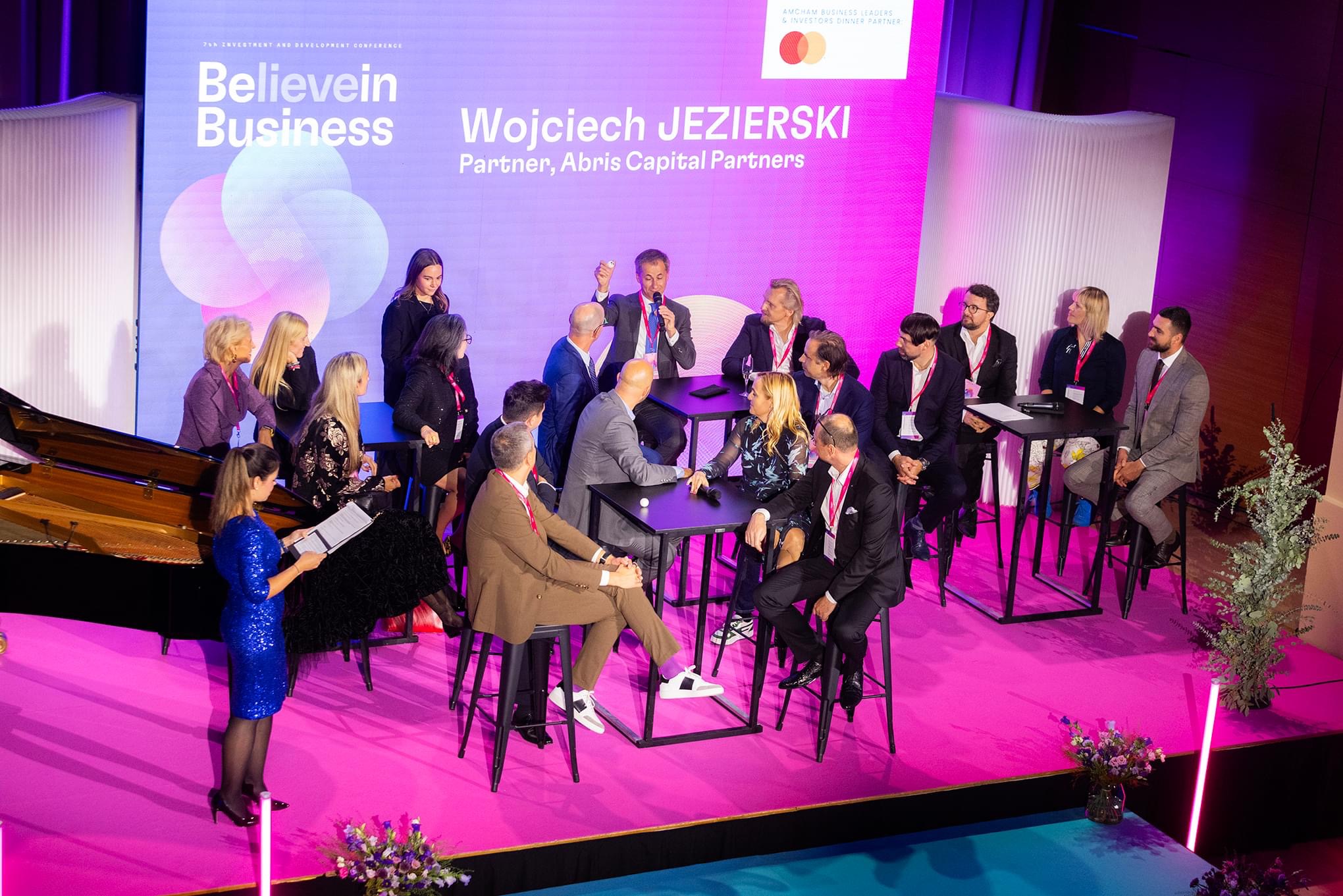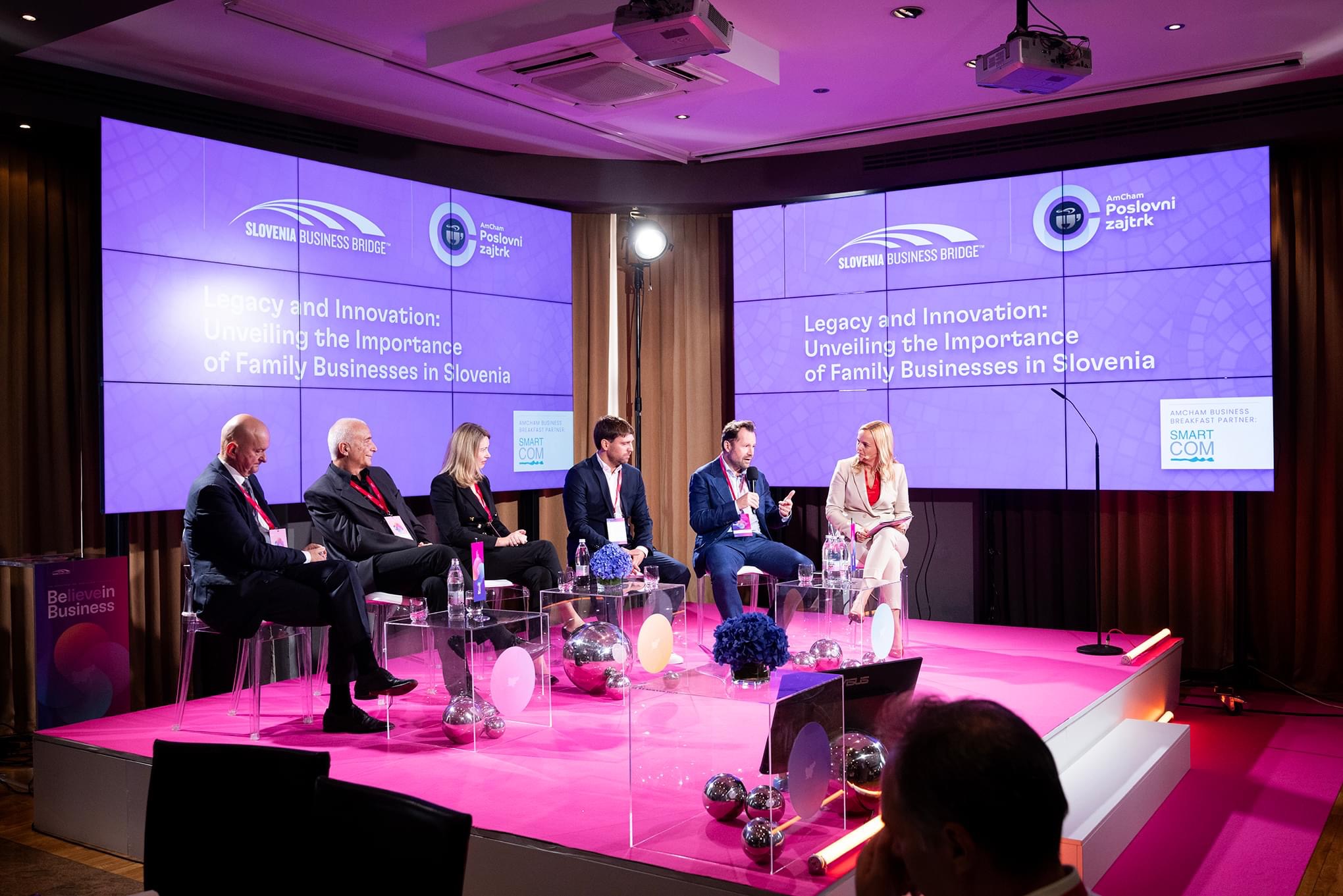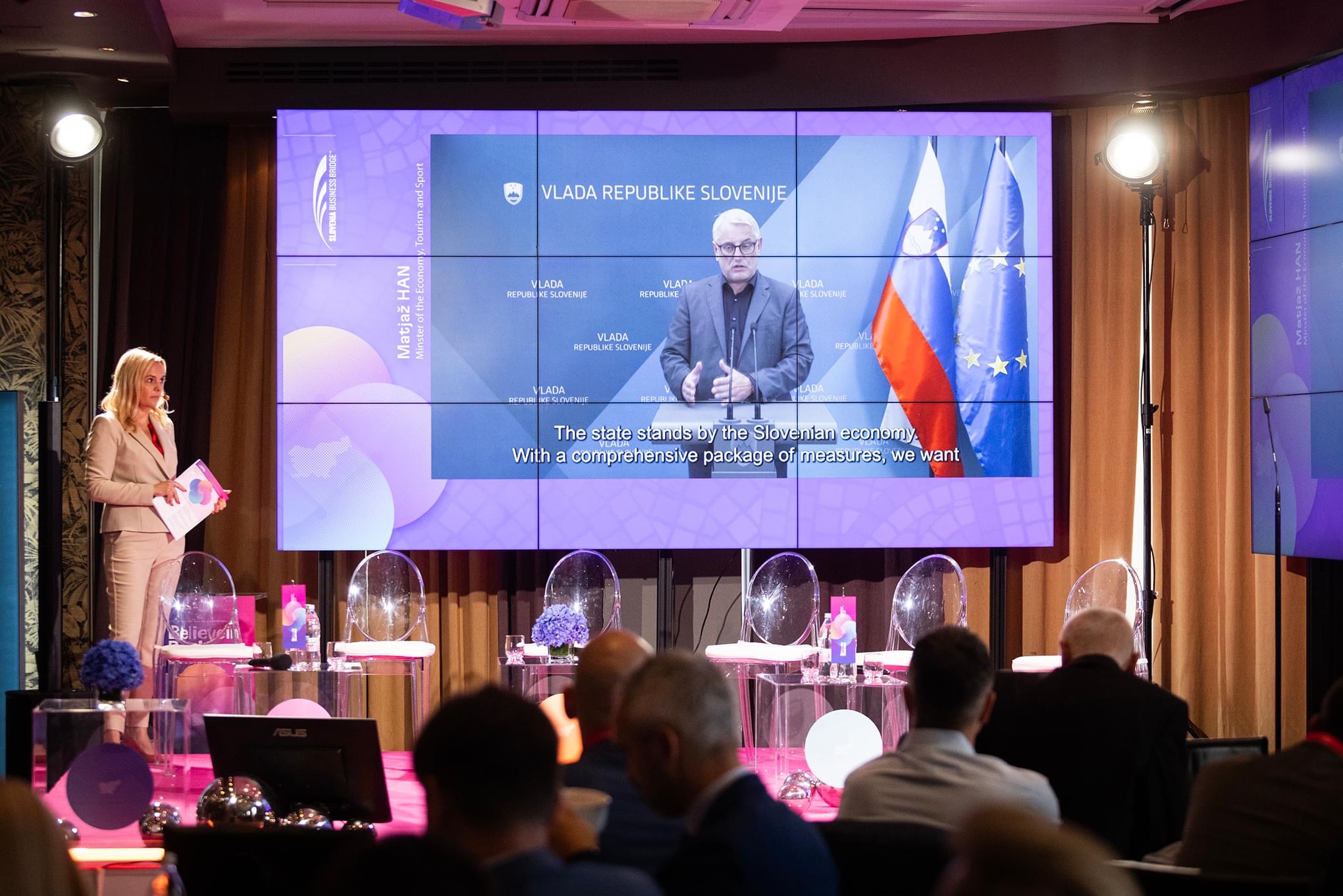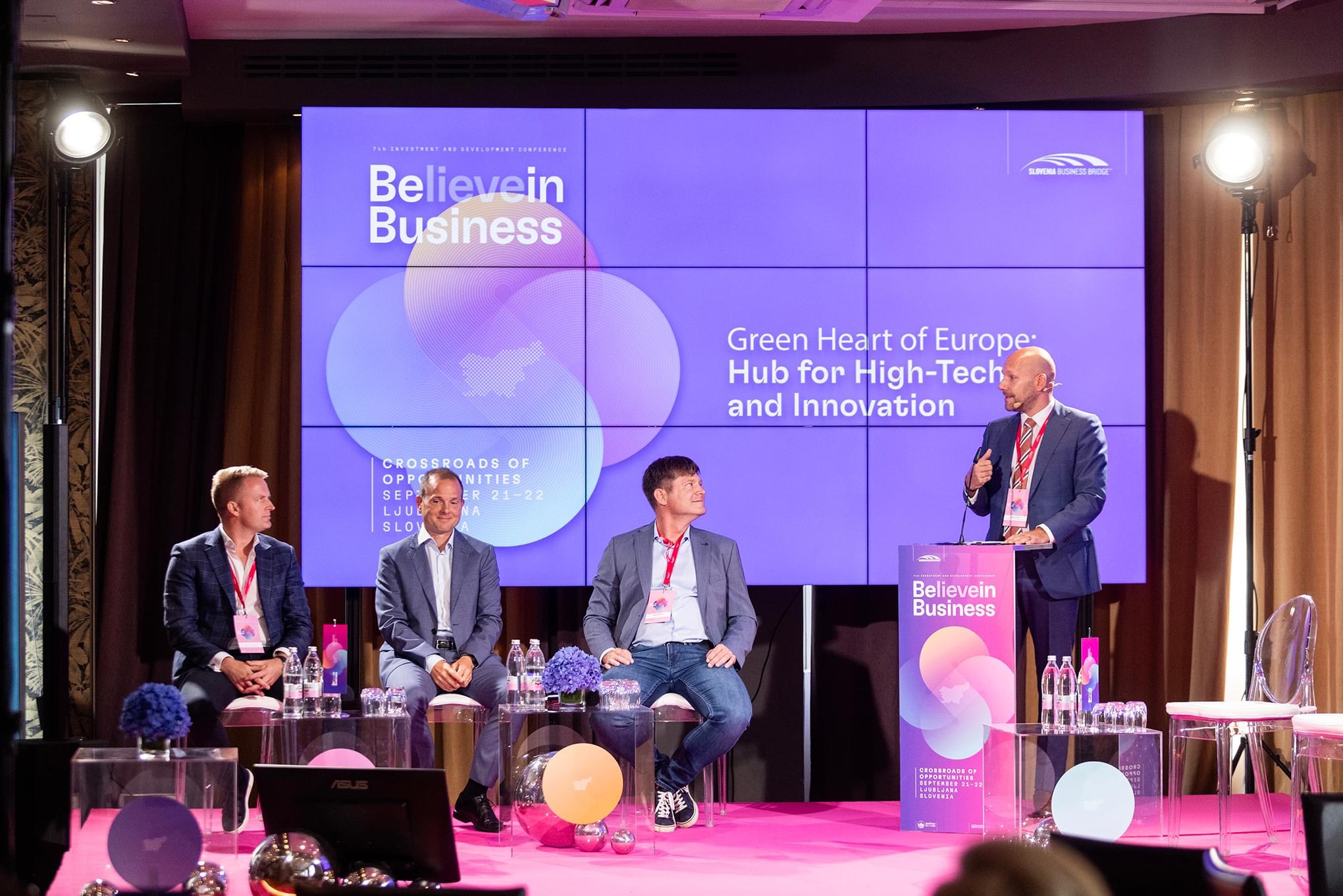Opening up Business and Partnerships Opportunities
The two-day 7th Investment and Development Conference Slovenia Business Bridge™, organized by AmCham Slovenia in cooperation with SPIRIT Slovenia and the Ministry of Economy, Tourism and Sport, opened with the pre-event “USA Connect: Unlocking Business and Partnership Opportunities,” which brought together companies from various industries and offered them the opportunity to network with experienced business developers and representatives of chambers of commerce.
Slovenia Shies Away from Talking About Itself and What it Brings to the World
The official opening event of the Slovenia Business Bridge™ brought together outstanding speakers who shared their understanding of the role and impact that big companies and international investment have on the country’s overall prosperity. The first panel, “Beyond Borders: Why Big Business Matters for National Prosperity?” featured Péter Bese, international retail directorate, OTP Group; Bartosz Ciołkowski, divisional president, South Eastern Europe, Mastercard; Božo Črnila, CEO, Trimo; John Denhof, CEO & president of the management board, Nova KBM; Matevž Frangež, state secretary for internationalization, entrepreneurship, development resources and tourism, Ministry of the Economy, Tourism and Sport; Mohamed Hammam, country manager, Adriatic Region, Pfizer and Robert Ljoljo, MSc, president of the board of management, Lek d.d. & country president, Sandoz Slovenia. All panelists agreed that Slovenia is an attractive country to live in and with a lot of talent. However, it still needs to prove its location, as well as improve the flexibility and predictability of the business and tax environment.
Ajša Vodnik, MSc, CEO, AmCham Slovenia, vice president, AmChams in Europe, who moderated the event, addressed the issues of predictability, what decision-makers can do in this respect, how we can work together better, and how we can be proud of our country.
Matevž Frangež pointed out that we need to have an idea of what we want to become and that we need to adjust all the main factors accordingly, as well as reduce the negative impacts of our system. “The tax system is not the main attraction we want to build on, but we need to be attractive and competitive for global talent, and we also need to understand that this is not what we are today. We firmly believe in strong social contracts; we need a solid basis and a deal that brings us these changes … We are investing heavily in partnerships between chambers.” He added: “In these difficult times – and given that Slovenia is a small economy – it needs to become more flexible. We need to look at change as inspiration.”
Robert Ljoljo also agreed on the need to secure a social construct, saying, “We have to be aware that we have a high percentage of the working-age population … Other companies can support big companies. Smaller companies can become champions with the help of big companies. Due to the nature of global business, the big companies pay close attention to ESG standards, for example. We are leading the way and setting the standards.” Bartosz Ciołkowski pointed out that “big companies innovate … This is a great value of global business that can make a big difference.” Péter Bese elaborated on how important it is for companies to have a sound banking sector. Mohamed Hammam said Slovenia is a country of talent and opportunity: “After moving to Slovenia, I was surprised by the great hospitality and English skills compared to other European countries! This opens out opportunities for many Slovenians. Slovenia shies away from talking about itself and what it brings to the world. There is a lot of talent here.”
Božo Černila said that we need to bring R&D centers to Slovenia and supported the statement with the argument that we have always had top-quality products and that this is not going away. What we have failed at are our business models. Matevž Frangež made a similar point: “In Slovenia, we are too hard on ourselves when determining what counts as success and failure … We must innovate the world!” John Denhof said that Slovenia is taking steps in the right direction: “The quality, the nature is incredible, but Slovenia lacks stability … We need to understand the importance of stability.”
“Life is Like a Box of … Opportunities”
The first day of the 7th Investment and Development Conference Slovenia Business Bridge™ ended with dinner with business leaders and investors, highlighting investment opportunities, innovation, and development. The dinner was a stimulus to encourage a dialogue between visionaries and innovative entrepreneurs who dare to challenge the status quo and industries that drive societies forward. Blaž Brodnjak, Group CEO, NLB d.d., President, AmCham Slovenia; Borut Čeh, co-owner and managing director, Labena Ltd; Dr. Maša Jazbec, artist, curator, researcher; Luka Trikić, co-founder & product manager, Connect the Dots and Žiga Vavpotič, co-founder and CEO, Bora Partners shared their views on opportunities in Slovenia and the region.
We Need to Join Forces to be Better – Whether in the Family or the Community!
The informative program continued on September 22. The second day of the 7th Investment and Development Conference, Slovenia Business Bridge™, was marked by three panels, which focused on topics related to Slovenia’s strengths and opportunities in the fields of sustainability, family entrepreneurship, and innovation, as well as digitalization and artificial intelligence. Slovenia is a country of family-run businesses whose rich traditions, enthusiasm, and entrepreneurial spirit foster innovation and development. Slovenia is the green heart of Europe, and its strategic location makes it an attractive investment destination. And in the age of artificial intelligence, Slovenia is successfully exploring a more comprehensive range of opportunities for innovation and improvement in different sectors. These were the main messages of the second day of the conference.
Ivo Boscarol, founder, co-owner & chairman emeritus, Pipistrel; Matjaž Han, Minister of the Economy, Tourism and Sport; Dr. Stjepan Orešković, principal investor, M+Grupa; Nuša Pavlinjek, managing director, Roto Group; Jure Podkrižnik, MSc, executive director, Podkriznik Group; Jure Remškar, chief financial & operations officer, Smart Com and Klemen Šešok, industrialist/real estate developer/sustainability advocate, Iskra and Ajša Vodnik, MSc, CEO, AmCham Slovenia, vice president, AmChams in Europe all took part in the AmCham Business Breakfast titled “Legacy and Innovation: Unveiling the Importance of Family Businesses in Slovenia.”
Family businesses account for 83% of all Slovenian enterprises, employ 70% of the active population, and contribute 67% of value-added, said Matjaž Han, who stressed the importance of solidarity and family businesses, which are the carriers of tradition and innovation. “Today, the importance of our constant efforts is seen in a completely different light. As a country, we have experienced a natural disaster that has reminded us of the importance of solidarity. Fortunately, despite our businesses’ difficulties, most of them are running smoothly. We have taken measures to help the companies affected … The fact is that water has changed the course of many lives. But it is businesses that have been hit hardest.” Dr. Stjepan Orešković began by saying: “Without science, there is no viable business. Without business, there is no serious science.” He went on stressing the importance of community, laying the foundation for a discussion on the strength of relationships and the extraordinary people Slovenia has. On community power, successful entrepreneur Ivo Boscarol added: “Nothing, especially great stories, can be done without the help of workers, without contributions from the municipality, etc. It is nice to give back to the community.”
The event also touched on the handover of family businesses to the next generation. “Only one in seven businesses survive after being handed over to the third generation. This is a key point where the state must take on the partner role and provide the support needed for a successful succession. We know that successful family business succession preserves jobs,” said Matjaž Han. The Ministry is taking various measures in this area. Jure Podkrižnik shared his views: “I believe that every company has its legacy … I see a lot of companies where the second or third generation have not been involved in the business before and therefore do not have the same respect from the employees.”
Jure Podkrižnik had an entrepreneurial mindset from a young age and a burning desire for business. He shared his experience attending meetings and giving business advice with his father, saying, “They saw me doing all sorts of things, from cleaning the building to generating new ideas. I gained their trust; they respected me and saw me as a leader.” He added: “We always try to show how passionate we are because business is about trust!”
Jure Remškar said that family businesses brought value to society in many ways and emphasized the importance of coming together for the common good in society and the business environment. “We need to join forces to improve – whether in the family or the community.”
Slovenia is not Small – It is Just the Right Size for Business!
The panel “Green Heart of Europe: Hub for High-Tech and Innovation” developed the idea that Slovenia is the green heart of Europe, with its strategic location at the European crossroads of opportunity and access to markets in both Western and Eastern Europe. The panelists also drew attention to the facts and challenges of an unstable business environment, which hinders the potential of a unique country like Slovenia.
The panelists were Andrzej Bartos, senior partner, Innova Capital; Rok Capl, acting director, SPIRIT Slovenia; Matjaž Filipič, partner & founder, KF Finance & ALFI Funds; Rob Irving, Ph.D., co-chair, global private equity, Dentons; Marko Ketler, senior partner, and attorney at law, Ketler and Partners, Member of Karanovic; Jure Mikuž, managing partner, South Central Ventures; Niklas Pichler, managing partner, Blackpeak Capital; Janez Škrubej, partner, Invera Equity Partners and Matjaž Ulčar, managing partner, Law Firm Ulčar & Partners.
Dr. Rob Irving pointed out that Slovenia is excellent in terms of innovation, creative thinking, and a highly educated workforce. Still, tax policy needs optimizing, as it is too high and changes too often, especially for small and medium-sized enterprises. This unpredictability makes it difficult to invest. He believes that the sectors of interest for investment are health, education, and IT. He continued by saying that Slovenia is a market that needs to think globally. Andrzej Bartos agreed: “ … international organizations ensure international growth.”
Rok Capl, among other things, also highlighted the partnership between SPIRIT Slovenia and AmCham Slovenia, which has been successfully building the bridge between Slovenia and the USA for many years, as evidenced by numerous events, projects, and joint business stories. Vida Dolenc Pogačnik, COO & international cooperation leader, pointed out that we should not think of Slovenia as a small country but just the right size for business.
It is essential that we work together. Technology is not the most challenging part of development.
The speakers of the conference’s last panel, “Synergizing Humans and Technology; The Power of AI for Future of Innovation and Business,” addressed a topical subject: AI. Its future is exciting and uncertain, with countless potential benefits, from improving healthcare and education to increasing efficiency and productivity across industries. However, concerns remain about its impact on employment, privacy, and security. The following speakers took part in the debate: Martin Bäuml, a senior staff engineer, Google; Benjamin Gošar, president of the management board, Triglav Skladi d.o.o.; Joško Mrndže, country director, Adriatics region, Google; Dr. Igor Papič, Minister of Higher Education, Science and Innovation; Dr. Mitja Pirc, director, Kearney and Jaka Repanšek, founder, RePublis, and co-chair of the AmCham IP Committee.
The panelists agreed that AI must benefit society. Minister Dr. Igor Papič stressed the need to improve technology transfer into everyday life. Dr. Mitja Pirc added: “We talk about how this affects people, but we see a lot of consequences in the business world as well, especially when it comes to better solutions to complex issues.” The Minister of Higher Education, Science and Innovation also addressed the necessary regulation of AI: “First, we need to determine each country’s stance. The main cause for concern is the potential misuse of these technologies. That is why we need some rules.” Joško Mrdnže believes that “We are the ones in control, we are behind the wheel.” By providing an example of the opportunities that AI opens up, Martin Bäuml illustrated how it can act as a learning tool in the education system. “If a student has a mentor, their productivity increases by up to 30%. AI tools are the mentors of the future.”
Ajša Vodnik, MSc, CEO, AmCham Slovenia, vice president, AmChams in Europe, closed the Investment and Development Conference and summarized its messages: “It was a powerful reminder that when people come together to share knowledge and promote positive change, amazing things happen! … Opportunities are the common denominator of the conference, but without implementation, they leave a lot to be desired.”
